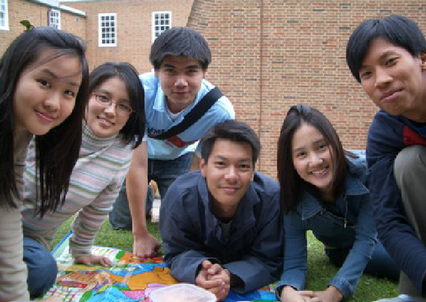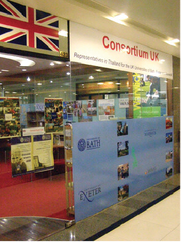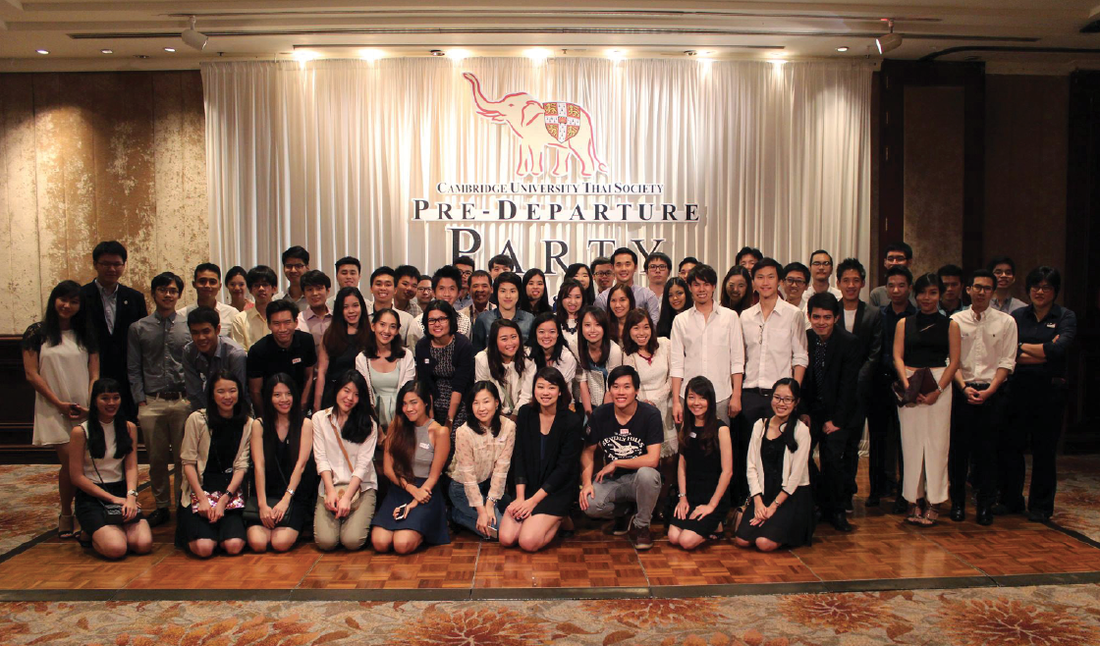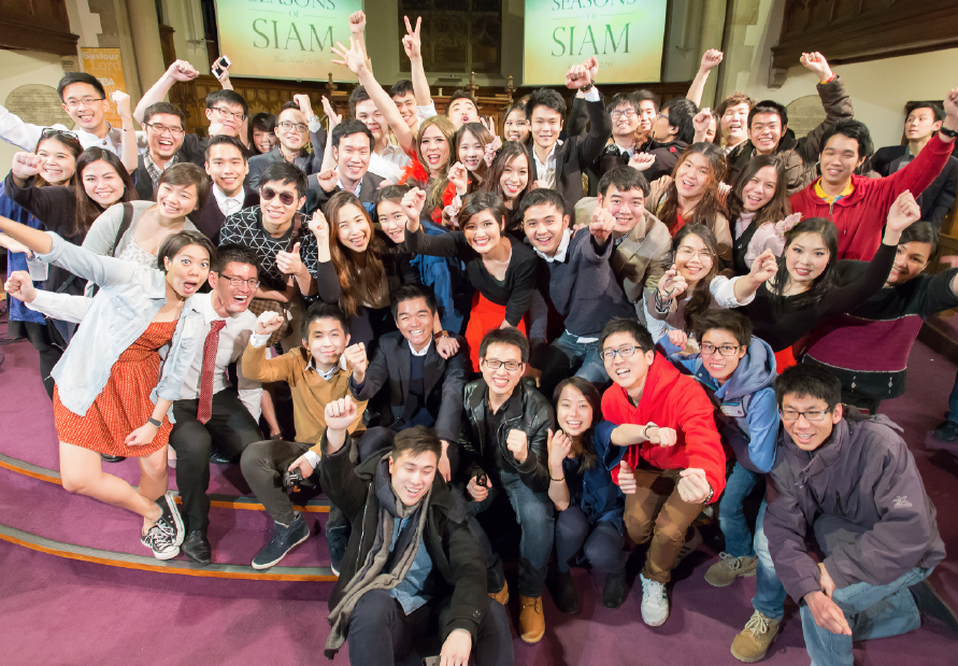By Justin Moseley, Managing Director, Consortium UK - official representative in Thailand of the UK universities of Bath, Exeter and Warwick
| STUDENTS finishing international schools may or may not have a clear idea of what they want to do with their A Levels, IB Diplomas, IGCSEs or APs/SATs, and equally they may or may not have a clear idea of their career path after university. Many students will hope that they can gain places at top overseas universities while parents, having spent a lot of money on a high school education, will naturally want their children to progress to study university bachelor’s degrees abroad. There are numerous examples of famous and successful people who have not completed a university degree (think Bill Gates of Microsoft and Richard Branson of Virgin), but most of those would very likely recommend to any young person that the best way to have a good chance of success is to gain the best academic qualifications possible before embarking on a career. |
So, what can students expect from a university education and from life at a university overseas? (think of that popular and so true old saying, 'the best years of my life were when I was a student'). The expectations when your studies end are likely to include an attractive CV/Resume, a nice degree certificate, enhanced academic knowledge, better job prospects, lots of extra life experiences and maybe lifestyle changes, prestige, and the knowledge that you have really achieved something on your own independently.
Although this article focuses on UK university expectations, much is equally relevant to those in Australia, New Zealand, Canada and the US.
Most UK bachelor’s degrees cover more basic general areas in the first year and become more focused in the second and third (or fourth and fifth) years. For example, a degree in biochemistry might have both basic chemistry and biology areas in the first year (which all students will do), but then move on to more specialist biochemistry areas in the second year. Similarly, a degree in business and marketing might have basic accounting areas in the first year (which all business-degree/BBA students will do too), but then move on to marketing-specific modules in the second and third years.
Some students may already have spent some of their high school years abroad before starting a degree overseas, but for those who have not, it may be hard to adapt to studying and life away from ‘home’. Students from international schools in Thailand may have been picked up from home and taken to school every morning, and it might, therefore, be a shock to suddenly discover that they have to make their own way to class!
The point here is the importance of understanding that independence is key; in the UK you are an adult at age 18, and you are expected to be responsible for your own actions. In fact, most UK universities guarantee on-campus accommodation to first-year international students, so the ‘shock’ may actually just be a five-minute walk!
Obviously, the main focus at university is on academic knowledge and achievement, and a hugely important thing is that students must do their own work and that plagiarism is totally unacceptable. If you are caught copying or cheating, you will likely be kicked out. Good time management is vital. If work has to be done by a time, then make sure you do it and hand it in on time. Lateness will often not be tolerated. At the same time, university life (apart from graduation days when everyone wears robes!) is very relaxed and informal. Casual clothing is the norm for lecturers and students; basically, you wear whatever you want.
The aim of most students is, of course, to start or further their careers after finishing university. A degree on its own is fine, but what can really attract potential employers is having some work experience.
Most UK degrees are three years, but many are now four years (sometimes referred to as ‘sandwich courses’) and include one-year work placement at a top organisation. For example, students from the University of Bath can benefit from work placements at McLaren and Williams F1 Teams, L’Oreal and Nike. The University of Warwick has close associations with Airbus and Jaguar/Land Rover. In addition to the valuable work experience, you also get paid a salary. And who knows, if they are really impressed by you, they may offer you a job when you finish studying.
If you want help with career advice, UK universities have excellent counselling services, and remember that top organisations are always looking for the top talent, and they attend job fairs at universities to seek the best students.
Although this article focuses on UK university expectations, much is equally relevant to those in Australia, New Zealand, Canada and the US.
Most UK bachelor’s degrees cover more basic general areas in the first year and become more focused in the second and third (or fourth and fifth) years. For example, a degree in biochemistry might have both basic chemistry and biology areas in the first year (which all students will do), but then move on to more specialist biochemistry areas in the second year. Similarly, a degree in business and marketing might have basic accounting areas in the first year (which all business-degree/BBA students will do too), but then move on to marketing-specific modules in the second and third years.
Some students may already have spent some of their high school years abroad before starting a degree overseas, but for those who have not, it may be hard to adapt to studying and life away from ‘home’. Students from international schools in Thailand may have been picked up from home and taken to school every morning, and it might, therefore, be a shock to suddenly discover that they have to make their own way to class!
The point here is the importance of understanding that independence is key; in the UK you are an adult at age 18, and you are expected to be responsible for your own actions. In fact, most UK universities guarantee on-campus accommodation to first-year international students, so the ‘shock’ may actually just be a five-minute walk!
Obviously, the main focus at university is on academic knowledge and achievement, and a hugely important thing is that students must do their own work and that plagiarism is totally unacceptable. If you are caught copying or cheating, you will likely be kicked out. Good time management is vital. If work has to be done by a time, then make sure you do it and hand it in on time. Lateness will often not be tolerated. At the same time, university life (apart from graduation days when everyone wears robes!) is very relaxed and informal. Casual clothing is the norm for lecturers and students; basically, you wear whatever you want.
The aim of most students is, of course, to start or further their careers after finishing university. A degree on its own is fine, but what can really attract potential employers is having some work experience.
Most UK degrees are three years, but many are now four years (sometimes referred to as ‘sandwich courses’) and include one-year work placement at a top organisation. For example, students from the University of Bath can benefit from work placements at McLaren and Williams F1 Teams, L’Oreal and Nike. The University of Warwick has close associations with Airbus and Jaguar/Land Rover. In addition to the valuable work experience, you also get paid a salary. And who knows, if they are really impressed by you, they may offer you a job when you finish studying.
If you want help with career advice, UK universities have excellent counselling services, and remember that top organisations are always looking for the top talent, and they attend job fairs at universities to seek the best students.
Make sure you regularly update your CV! Another way to gain work experience (and have fun!) is to take a job during the long summer holidays from July to September. Any work experience is useful because potential future employers are looking for well-rounded, open-minded and well-balanced people, so if you have worked successfully as a waiter in a busy hotel or restaurant it means you likely have good interpersonal skills, are willing to work hard, have a good sense of humour, and are able to be part of a team.
Some UK degrees offer the chance of a year studying at a university in another country, maybe in Europe or the USA. So, if you are doing a degree in international studies, you might have the chance to study in, for example, in Paris for a year, a truly international experience.
The UK is also well-placed for students to explore the varied cultures and history of Europe. In contrast, the USA, Canada and Australia are relatively isolated and thus have less diversity in travel options. In addition, and perhaps more importantly, the UK offers a far longer historical background for students to explore, something which I hope will make students become keener to encourage the preservation of old buildings and traditional environments in Thailand.
EU funding has meant that some European universities have been able to provide full (or very significant) funding, an understandable attraction. But a major problem with this can be that, whilst English is the studying language, communication and adapting to living outside the study environment can be quite stressful.
Aside from studying, UK universities offer wonderful chances for you to develop outside interests. All universities have active student unions, but there are also clubs and societies to join (and if there is nothing that interests you, then start your own club!!). Trips, visits, holidays, etc., are regularly organised, so you may have the chance to climb Mount Kilimanjaro in Africa or just go to see a play at the Royal Shakespeare Theatre! The Thai Society at the University of Warwick is famous for its ‘Thai Night’ which gives everyone a chance to experience some Thai food, music, dancing and even a ‘ladyboy’ show!
The UK has received criticism from some quarters for making study visa applications more difficult in recent years. Very few Thai students have visa applications refused, and most refusals are due to not having provided the correct financial information (and when this has been provided, they have received their visa).
The UK wants genuine international students, but it does not want people who are using a student visa as a means of entering the UK with no intention to study. Quite simply, if you are a genuine student then you will be most welcome. For actually doing the visa application and getting visa advice, then it helps to talk to people who are experts in dealing with these things, which is where Consortium UK and I can help.
In the UK, university tuition (study) fees are higher for international students than for Home/EU students. Accommodation fees are the same for all students. When applying for a student visa, a student starting a three (or four/five) year bachelor’s degree will need to provide evidence of funding to cover first-year tuition fees and nine months’ maintenance (living) expenses (currently 1,015 pounds per month). For example, if tuition fee is 18,000 pounds, you need to provide bank account details that show funds of a minimum of 27,135 pounds (18,000 + 9,135).
Being happy while you are studying is very important. Everyone is likely to be homesick from time to time (but you may also be 'sick of home', as one student once said to me!), but that is normal; there are highs and lows in most things. However (and this is really important), if you ever have a problem then ASK FOR HELP. Someone will be there for you if you need it and all universities have these people available; just ask...
Oxford and Cambridge are among the best universities in the world and are arguably the most famous. They get the absolute cream of the top students, and obviously if you think you have a chance to study at either then get your UCAS application in before 15th October! However, just being at such a prestigious university does not guarantee success or enjoyment. You are going to be among the elite of university academia and that may or may not be comfortable for you. Also, do remember that some of the famous lecturers and other academics may not always be available.
The UK is fortunate to have a state/government checked university system that ensures very good quality, even at universities that do not have the prestige of Oxford and Cambridge. There is a very high-quality range of other universities that do not quite match the prestige and rankings of Oxford and Cambridge but are almost as good (maybe better in some areas), such as Warwick, Imperial, LSE, Durham, St Andrews, Bath, etc. University rankings can be confusing and misleading and it may be that a lower-ranked university is more suitable for you. Oxford and Cambridge tend to be more ‘traditional’ in the sense of the classic arts and sciences, whereas some other universities may have more specialist and diverse subject areas.
Some UK degrees offer the chance of a year studying at a university in another country, maybe in Europe or the USA. So, if you are doing a degree in international studies, you might have the chance to study in, for example, in Paris for a year, a truly international experience.
The UK is also well-placed for students to explore the varied cultures and history of Europe. In contrast, the USA, Canada and Australia are relatively isolated and thus have less diversity in travel options. In addition, and perhaps more importantly, the UK offers a far longer historical background for students to explore, something which I hope will make students become keener to encourage the preservation of old buildings and traditional environments in Thailand.
EU funding has meant that some European universities have been able to provide full (or very significant) funding, an understandable attraction. But a major problem with this can be that, whilst English is the studying language, communication and adapting to living outside the study environment can be quite stressful.
Aside from studying, UK universities offer wonderful chances for you to develop outside interests. All universities have active student unions, but there are also clubs and societies to join (and if there is nothing that interests you, then start your own club!!). Trips, visits, holidays, etc., are regularly organised, so you may have the chance to climb Mount Kilimanjaro in Africa or just go to see a play at the Royal Shakespeare Theatre! The Thai Society at the University of Warwick is famous for its ‘Thai Night’ which gives everyone a chance to experience some Thai food, music, dancing and even a ‘ladyboy’ show!
The UK has received criticism from some quarters for making study visa applications more difficult in recent years. Very few Thai students have visa applications refused, and most refusals are due to not having provided the correct financial information (and when this has been provided, they have received their visa).
The UK wants genuine international students, but it does not want people who are using a student visa as a means of entering the UK with no intention to study. Quite simply, if you are a genuine student then you will be most welcome. For actually doing the visa application and getting visa advice, then it helps to talk to people who are experts in dealing with these things, which is where Consortium UK and I can help.
In the UK, university tuition (study) fees are higher for international students than for Home/EU students. Accommodation fees are the same for all students. When applying for a student visa, a student starting a three (or four/five) year bachelor’s degree will need to provide evidence of funding to cover first-year tuition fees and nine months’ maintenance (living) expenses (currently 1,015 pounds per month). For example, if tuition fee is 18,000 pounds, you need to provide bank account details that show funds of a minimum of 27,135 pounds (18,000 + 9,135).
Being happy while you are studying is very important. Everyone is likely to be homesick from time to time (but you may also be 'sick of home', as one student once said to me!), but that is normal; there are highs and lows in most things. However (and this is really important), if you ever have a problem then ASK FOR HELP. Someone will be there for you if you need it and all universities have these people available; just ask...
Oxford and Cambridge are among the best universities in the world and are arguably the most famous. They get the absolute cream of the top students, and obviously if you think you have a chance to study at either then get your UCAS application in before 15th October! However, just being at such a prestigious university does not guarantee success or enjoyment. You are going to be among the elite of university academia and that may or may not be comfortable for you. Also, do remember that some of the famous lecturers and other academics may not always be available.
The UK is fortunate to have a state/government checked university system that ensures very good quality, even at universities that do not have the prestige of Oxford and Cambridge. There is a very high-quality range of other universities that do not quite match the prestige and rankings of Oxford and Cambridge but are almost as good (maybe better in some areas), such as Warwick, Imperial, LSE, Durham, St Andrews, Bath, etc. University rankings can be confusing and misleading and it may be that a lower-ranked university is more suitable for you. Oxford and Cambridge tend to be more ‘traditional’ in the sense of the classic arts and sciences, whereas some other universities may have more specialist and diverse subject areas.

One of the best ways to choose suitable universities is to visit them. What looks wonderful on the website or in the prospectus but it may not be suitable for you. In that case, you do not want to apply, get accepted and then be unhappy when you see it for the first time when you arrive. All universities have open days, but if you cannot go on those days then contact the university (or ask me) to arrange a personal visit. So, I would recommend a combined holiday to the UK with a quick tour of some universities that interest you.
One of the things that I've enjoy from assisting so many Thai students over the years is seeing them return from the UK and use what they have gained to further their own careers and businesses here. Education in the UK has typically given them the chance to be more creative individually, develop their own ideas and this reflects on Thai society in general. The UK is recognised and respected as the founder of so many things
You decide! The person who makes the final decision on what and where to study should be the student, NOT the parents.
UK education and its links with Thailand – a general overview:
Thailand and the UK are linked in many ways. Both have long and interesting histories with royal families leading the way. Other native English speaking countries just do not have the same historical links that Thailand has with the UK, and a student from Thailand, just like those first sent there by King Chulalongkorn, will gain from the many fine institutions that make up the UK education system.
The UK education system is a combination of the best traditions and modern life. Some UK universities and schools are among the oldest in the world; others are some of the newest and most forward-thinking – there is no better example of this than the University of Warwick, which has achieved so much in just 50 years. UK educational institutions provide globally recognised qualifications of the highest academic and practical standards. Many international businesses and professional organisations, whose head offices are often outside Britain, have direct links with UK universities because of their continued excellence.
There is no better example of a successful Thai person who has benefitted from a UK education than twice-Thai Prime Minister Anand Panyarachun, who studied at Dulwich College and the University of Oxford.
One of the things that I've enjoy from assisting so many Thai students over the years is seeing them return from the UK and use what they have gained to further their own careers and businesses here. Education in the UK has typically given them the chance to be more creative individually, develop their own ideas and this reflects on Thai society in general. The UK is recognised and respected as the founder of so many things
You decide! The person who makes the final decision on what and where to study should be the student, NOT the parents.
UK education and its links with Thailand – a general overview:
Thailand and the UK are linked in many ways. Both have long and interesting histories with royal families leading the way. Other native English speaking countries just do not have the same historical links that Thailand has with the UK, and a student from Thailand, just like those first sent there by King Chulalongkorn, will gain from the many fine institutions that make up the UK education system.
The UK education system is a combination of the best traditions and modern life. Some UK universities and schools are among the oldest in the world; others are some of the newest and most forward-thinking – there is no better example of this than the University of Warwick, which has achieved so much in just 50 years. UK educational institutions provide globally recognised qualifications of the highest academic and practical standards. Many international businesses and professional organisations, whose head offices are often outside Britain, have direct links with UK universities because of their continued excellence.
There is no better example of a successful Thai person who has benefitted from a UK education than twice-Thai Prime Minister Anand Panyarachun, who studied at Dulwich College and the University of Oxford.

Justin Moseley, MD, Consortium UK. Agent of the Year 2013/14 – University of Bath School of Management
www.consortiumuk.net
Justin is a UK national born in Stratford-upon-Avon, the birthplace of William Shakespeare (which is very near Warwick), and he has lived and worked in Thailand in the education sector since 1992. He has been responsible for representing UK universities in Thailand since 2002. He is an active member of the British Chamber of Commerce Thailand www.bccthai.com, and regularly visits the universities in the UK and contributes to university conferences and has excellent contacts with academic and administration staff. He is constantly trying to influence ways to make the student visa application process easier. He can be contacted via the Consortium UK website and office at [email protected]
www.consortiumuk.net
Justin is a UK national born in Stratford-upon-Avon, the birthplace of William Shakespeare (which is very near Warwick), and he has lived and worked in Thailand in the education sector since 1992. He has been responsible for representing UK universities in Thailand since 2002. He is an active member of the British Chamber of Commerce Thailand www.bccthai.com, and regularly visits the universities in the UK and contributes to university conferences and has excellent contacts with academic and administration staff. He is constantly trying to influence ways to make the student visa application process easier. He can be contacted via the Consortium UK website and office at [email protected]




 RSS Feed
RSS Feed
















